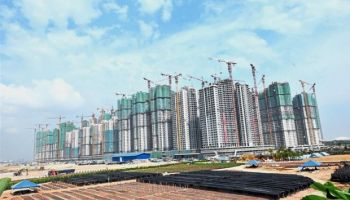 |
| NGOs criticise govt on ICERD flip flop |
At Malay Rights Rally, Lokman Calls D
https://youtu.be/XJf8SfrO87s
THE line in the sand will be more clearly drawn than ever after tomorrow, with the predominantly Malay political opposition on one side and a more mixed ruling coalition on the other.
The anti-Icerd rally engineered by PAS and Umno has all the signs of being the biggest Malay-Muslim street protest the country has ever seen in recent times.
Parallels are being drawn to the mammoth Islamist rally in Jakarta last weekend that turned the biggest intersection in the Indonesian capital into a sea of people, all wearing white.
At the same time, an alternative rally organised by Suhakam to mark human rights day, aims to send out the message that Icerd or the International Convention on the Elimination of All Forms of Racial Discrimination also has support among fair-minded Malaysians.
Clarity is good in politics but not in this case because the line in the sand indicates the deepening cleavage in Malaysian politics.
The spark for the anti-Icerd rally was lit by opposition to the government’s move to ratify the United Nations’ human rights charter.
But it has since evolved into what looks to be a show of force by Malay-Muslim political parties and NGOs.
They want to tell the powers-that-be to be more sensitive and respectful when it comes to issues of race and religion.
“Let the Icerd issue be a lesson, so that there won’t be anything like that again in the future, said PAS deputy information chief Roslan Shahir.
There is also the deniable element of opportunistic politics, given that the main drivers of the rally are PAS and Umno.
It is no secret that both parties are keen to measure their support in New Malaysia.
“We are not going to pretend that it is not about politics.
“We want to show that two-thirds of Malays are not with Pakatan Harapan,” said Roslan.
And, as he pointed out, Bersih began as a movement for free and fair elections and grew into a movement to topple the Barisan Nasional government.
Size matters in politics, and everyone is anxious to see the turnout at the two rallies.
“I don’t think the wider Malay public is taking the (anti-Icerd) rally seriously now that the government has decided not to ratify Icerd.
“But it gives Umno and PAS supporters an outlet to vent their emotions against the government,” said Merdeka Centre director Ibrahim Suffian.
Given that, Ibrahim said ordinary Malays may not come out in large numbers, and the anti-Icerd rally is more likely to attract hardcore supporters of both parties.
However, if the level of organising behind the anti-Icerd rally is anything to go by, it will not be a small or quiet affair.
No less than former IGP Tan Sri Musa Hassan and retired Chief Justice Tun Abdul Hamid Mohamad have expressed support.
Abdul Hamid, who is not in good health, had dramatised his support by arriving for an anti-Icerd forum in an ambulance and speaking on stage in a wheelchair.
The optics this Saturday will be quite powerful, and it will be exhilarating for some and worrying for others.
Just as the Bersih protests became a manifestation of the dislike for Datuk Seri Najib Tun Razak’s government, the anti-Icerd rally will be a gauge of Malay sentiments towards Tun Dr Mahathir Mohamad’s government.
According to a senior Malay journalist, the furor over Icerd also has to do with the build-up of Malay undercurrents over other issues such as the appointments of the Attorney General and Finance Minister.
“Then Icerd came along and it became too much for them to swallow.
“Dr Mahathir realised that if he pushed ahead with Icerd, his government will fall in the next general election,” said the journalist.
The Suhakam rally, to be held in Petaling Jaya, is likely to draw a moderate crowd but will reportedly feature Dr Mahathir and his Cabinet ministers.
“The Prime Minister has to show that no single side has monopoly over the Malay ground.
“He has to be seen out there because keeping quiet would suggest that you have surrendered or lost,” said political commentator Khaw Veon Szu.
Pakatan’s image has also been dented by its inability to defend Icerd.
Many equated New Malaysia with a future where there is greater equality and where policies are not based on race or religion.
They are disappointed that Dr Mahathir who took on the Malay Rulers and survived religiously-tinged issues like Memali, has been unable to push ahead with Icerd.
Likewise, DAP’s silence on Icerd has surprised its supporters given the party’s famous rallying cry of “Malaysian Malaysia”.
Critics out there complain that it took MCA 60 years to become cowed by Umno but it took DAP only six months to become like MCA.
Given the mix of emotions over Icerd, some are wondering whether it is a good idea for Dr Mahathir to launch the Suhakam gathering.
His coalition is struggling with Malay support and what he says at the rally will be misinterpreted and twisted in the less-than-wonderful world of social media.
For instance, Dr Mahathir’s latest blog posting, where he used a broad brush to paint Malay culture as corrupt drew caustic reactions from netizens asking him to justify the immense wealth of his children.
Dr Mahathir has been an experienced and reliable pair of hands in a Cabinet dominated by greenhorns and less than competent people but his second coming has not been as smooth as expected.
He is struggling to deliver.
In a sense, the anti-Icerd rally is a personal challenge to his leadership as the top Malay and Muslim leader.
The two biggest Malay political parties in the country are flexing their muscles and Dr M will have a chance to assess the extent of their support tomorrow.The Star by Joceline Tan
Related:










